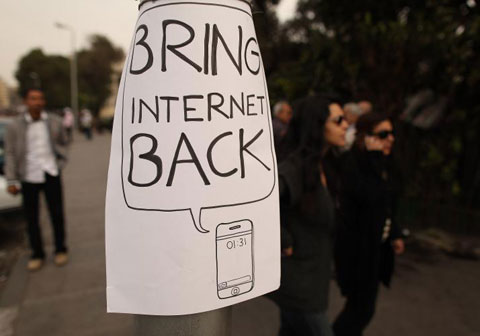
Social Networks in the Geopolitical Arena

In Egypt, the Mubarak government moved quickly to shut down Internet access in an attempt to control the rapidly escalating public revolt.
[imageframe lightbox=”no” style_type=”none” bordercolor=”” bordersize=”0px” stylecolor=”” align=”right” animation_type=”0″ animation_direction=”down” animation_speed=”0.1″ class=”” id=””][/imageframe]
If anyone still doubts the transformational effects the digital media are having on our culture, the recent events in Egypt and Tunisia should finally set them to rest. In both cases, social networks, predominately Facebook and Twitter, are acknowledged as being instrumental in the coordination and spread of public defiance of the respective governments. In Egypt, the Mubarak government moved quickly to shut down Internet access in an attempt to control the rapidly escalating public revolt. If history is to be taken as an example, this is more likely to inflame the situation even further.
The right to assemble may be one of the least appreciated of those granted by the U.S. Constitution. Yet it held great meaning for the men who drafted it. The Massachusetts Government Act was one of the Intolerable Acts that outraged the colonies and led to the revolution against British rule. This Act replaced virtually all government officials with appointees of the governor or king, and limited town meetings to one a year – attempting to stifle the voice of the population in public affairs.
The storming of the Bastille is perhaps our most vivid image of the beginning of the French Revolution. However, the first act of defiance against the crown occurred earlier, in response to the closing of the Estates-General by Louis XVI, in an attempt to squelch discussion of a national constitution. After finding the doors locked and guarded by troops, the members of the Third Estate met in a nearby Tennis Court, with all but one of the 577 representatives of the people signing an oath, “not to separate, and to reassemble wherever circumstances require, until the constitution of the kingdom is established.” Despite all of the hardships and inequities suffered under the regime, it was losing the right to meet and speak freely that pushed the French people to their first act of revolution.
Today, abridging the right to assemble is much harder than just locking doors. The Tor Project offers free software downloads that enable Internet users to keep their identities anonymous and browsing history private when online. Since the government crackdown, the deluge of downloads from Egypt nearly overwhelmed the Tor Project servers. Despite the crackdown, tech-savvy Egyptians have begun to connect through their mobile phones to a service in France that puts them back online. Technology is not simply removing geographic restrictions to communication, but the power of governments to control it as well.
While most discussions of social networks tend to revolve around the ways they affect our daily lives, what may be more far reaching in the long run will be the transformational affects that they will have on the political process. In one sense, giving so many competing interests a voice results in a cacophony that dilutes opinion and retards cohesive action. However, when a message resonates across political and social boundaries the result can be game changing, rapidly turning dissent and unrest into political upheaval.
